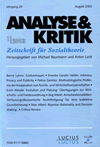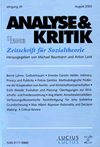Suchergebnisse
"Dominic Roser"
Titel: Stepping in for the Polluters? Climate Justice under Partial Compliance
Autor: Sabine Hohl / Dominic Roser
Seite: 477-500
Abstract: Not all countries do their fair share in the effort of preventing dangerous climate change. This presents those who are willing to do their part with the question whether they should ’take up the slack’ and try to compensate for the non-compliers’ failure to reduce emissions. There is a pro tanto reason for doing so given the human rights violations associated with dangerous climate change. The article focuses on fending off two objections against a duty to take up the slack: that it is unfair and ineffective. We grant that it is unfair if some have to step in for others but argue that this does not amount to a decisive objection under conditions of partial compliance. With regard to the charge of emission reductions being ineffective, we argue that the empirical case for this claim is missing and that even if it were not, there still remains the option of taking up the slack in other forms.
Titel: Comment on Sabine Hohl and Dominic Roser: Stepping in for the Polluters? Climate Justice under Partial Compliance
Autor: Thomas Pölzler
Seite: 501-508
Titel: Distributive Justice and Climate Change. The Allocation of Emission Rights
Autor: Lukas Meyer / Dominic Roser
Seite: 223-249
Abstract: The emission of greenhouse gases causes climate change. Therefore, many support a global cap on emissions. How then should the emissions allowed under this cap be distributed? We first show that above average past emissions cannot be used to justify a right to above average current emissions. We then sketch three basic principles of distributive justice (egalitarianism, prioritarianism, and sufficientarianism) and argue, first, that prioritarian standards are the most plausible and, second, that they speak in favour of giving people of developing countries higher emission rights than people of industrialised countries. In order to support this point it has to be shown, inter alia, in what ways the higher past emissions of industrialised countries are relevant for today’s distribution of emission rights.

The Relevance of Ideal Justice
2011 (33) Heft 2
Guest-Editors: Lukas Meyer / Pranay Sanklecha
Editorial
Whether and how normative theorising can be relevant for guiding people’s actions is one of the classical questions of moral and political philosophy. Platon’s dialogues Politeia, Politikos and Nomoi provide fascinating discussions on the topic. Recently normative theorists have investigated some aspects of these questions under the title of ideal and non-ideal theorising—relying on a distinction that Rawls introduced in A Theory of Justice (1971) and made use of in his The Law of Peo...

Ecological Goals and Liberal Ideals: Harmony or Conflict?
2006 (28) Heft 2
Guest-Editor: Thomas Schramme
Editorial
Liberty, equality, justice and solidarity are traditional political ideals of modern Western democracies. Different traditions and parties have supported different models in order to harmonise them. In contrast to the prevalence and long history of these values, ecological goals and needs have moved onto the political agenda fairly recently. Hence it should not come as a surprise that there is no consensus about the compatibility of ecological ambitions with common Western political ideals. Righ...